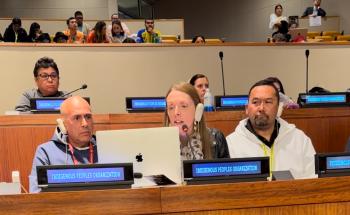Image Caption
Summary
Local Journalism Initiative Reporter
Windspeaker.com
Dr. Amy Hudson has returned from the United Nations Permanent Forum on Indigenous Issues (UNPFII) with renewed vigour to fight for NunatuKavut Inuit’s way of life in the face of climate change.
Hudson, who was part of a four-member delegation from the NunatuKavut Community Council (NCC) to attend the forum in New York last week, says hearing stories from other Indigenous delegations who continue to struggle against Eurocentric governments was “personally humbling.”
“When you come to these…global spaces with Indigenous peoples from all parts of the world and you're hearing and sharing in these realities where you see all these similarities--similar experiences and impacts of colonization, similar approaches and assertions of self-government and self-determination from Indigenous people--it's strengthening…and certainly validat(ing) in the sense that we're all in this together,” said Hudson.
NCC is the representative governing body for the 6,000 Inuit of south and central Labrador, about nine per cent of Canada’s Inuit population. In 2019, NCC and Canada signed a memorandum of understanding to negotiate self-determination. While those negotiations are ongoing, NCC continues to exercise its inherent rights to self-government in such areas as health, education, land and resources.
This year’s theme of the forum was “Indigenous peoples, human health, planetary and territorial health and climate change: A rights-based approach.”
NunatuKavut Inuit are part of a global community and need to be part of that wider discussion even as they feel the impacts of climate change at home, says Hudson.
“It was really important to have the opportunity to learn from the global community, the global Indigenous community, but to also have an opportunity to share some of our stories and some of our history and to talk about the importance of any concepts of governance in responding to climate change issues,” she said.
The delegation was allowed only three minutes to make a formal presentation in which “we really situated who Inuit are, where we live, and really centred around our relationship and our deep sense of belonging to our ancestral lands and why that’s important,” said Hudson.
Key impacted areas and emerging issues were also outlined in those three minutes.
A side panel event that NCC hosted allowed the delegation to fill in the details.
Already, says Hudson, sea ice conditions are changing and sea levels are rising.
NCC’s coastal communities rely on sea ice for transportation to their ancestral traditional places, which allow for intergenerational knowledge transfer and gathering of traditional foods.
Unpredictable weather patterns and changing temperatures are also impacting the ocean and having adverse effects on the fishing industry.
Coastal erosion and rising sea levels are disturbing cultural heritage and archaeological sites.
Hudson also draws attention to the animal-human relationship and the polar bears in her home community of the Island of Ponds, an island off of the east coast of Labrador. She says the bears are roaming the entire coast, something unheard of in years past, showing aggression and are less wary of people.
“We’re really now developing relationships with academia so that we can better understand what are causing these changes and how we may be able to mitigate and adapt to the changes that we're seeing,” said Hudson.
The side panel event also allowed NCC to “talk about climate governance and from the perspective of Inuit resistance, resilience and adaptation.”
Hudson says NunatuKavut Inuit are drawing from their own intergenerational knowledge and expertise to inform their understanding of climate change and how to move forward.
“Our approach to responding to climate change must be holistic and it must come from Inuit values. It must come from a place where Inuit want to see themselves in generations to come. So how we respond, the knowledge we have to share and contribute is important,” said Hudson.
Unfortunately, western and Eurocentric governments are reluctant to engage Indigenous peoples in that important conversation, she said.
Hudson points to what she calls Canada’s “arbitrary recognition of Indigenous rights” despite passage of the United Nations Declaration Act, which sets out ways to incorporate the UN Declaration on the Rights of Indigenous Peoples into federal legislation. The federal government is presently working on an action plan with Indigenous communities and organizations to make that happen.
“We recognize our responsibility to our lands, waters and ice and future generations, and to our natural environment, so we have to be a part of this conversation with (the government) in equal ways, and those ways certainly must be understood that our rights need to be upheld and we can't disconnect our right to self-governance from our inherent rights as Indigenous people,” said Hudson.
In Canada and globally, the push for a renewable energy as a means to tackle climate change is a “new way of colonizing” Indigenous people, says Hudson, as traditional lands are being exploited for mineral extraction and mining companies are seeing permits fast-tracked.
“What I understood from the forum at the UN was that Indigenous peoples are asserting and upholding their rights and making the connection between their rights to the work of responding to global climate change,” said Hudson.
“I didn't hear anyone in the Indigenous community abdicate their responsibilities to responding to climate change. I heard that we all have strength and knowledge that are important to ensuring a just future for our community.”
Never miss a Windspeaker article. Subscribe Today to our new Windspeaker Newsletter!
Local Journalism Initiative Reporters are supported by a financial contribution made by the Government of Canada.

